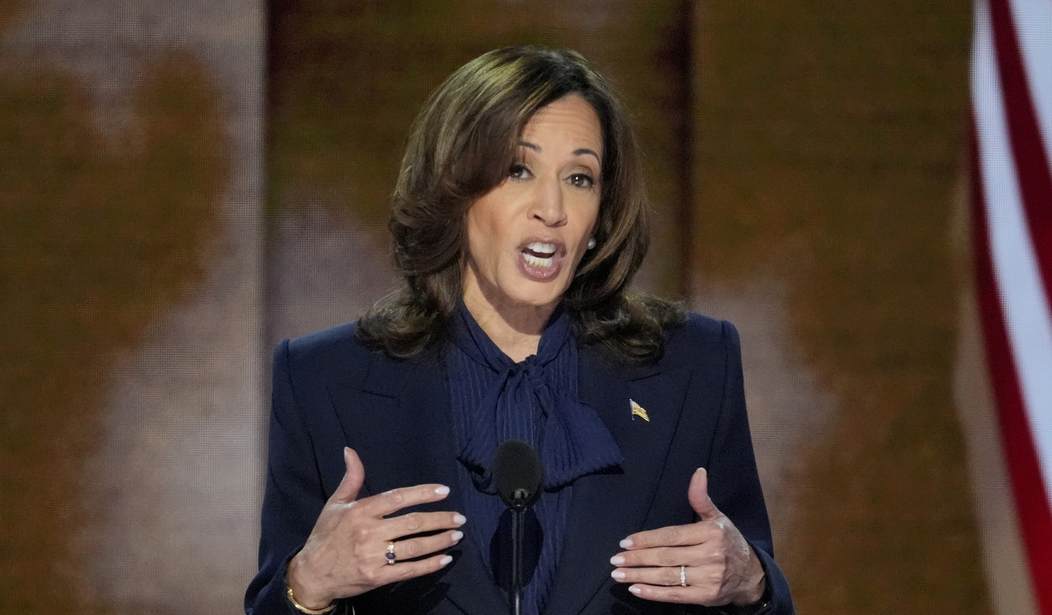Last night, Kamala Harris repeatedly asserted that she would "chart a new course," or "chart a new way forward." For that, one would expect a chart or two.
Harris competently delivered a well-received but nearly substance-free acceptance speech at the Democratic National Convention. At 37 minutes, give or take, it ran long enough for the occasion without tiring the audience, in the hall or on television. And mirablile dictu, we never got the ubiquitous Harris incantation, "what we can be, unburdened by what has been."
Which in this case was rather ironic, since at least a third or more of Harris' speech was devoted to what has been -- her "personal story." And nearly none of it had anything to do with "what has been" over the last four years, or indeed since Harris left her office as Attorney General. Harris never mentioned her time in the US Senate, or indeed much at all about spending the last three and a half years as Vice President in the current administration.
We'll get back to that shortly. The choice to spend the first ten minutes of her 37-minute speech talking about her distant past -- mostly her childhood -- seemed very strange for an already well-known political figure. This all got covered in 2019 during her doomed presidential primary campaign, and then again in 2020 when Joe Biden chose her as his running mate. Her sister Maya had just covered that same ground in a speech shortly before hers (and which was followed weirdly by Roy Cooper for no good apparent reason rather than Kamala). And if that wasn't enough, the video introduction to Kamala's speech also covered all of that same ground.
Suddenly, not only is Kamala "burdened by what has been," so were we all -- including discussion of her parents' divorce. What was the point of that, electorally speaking? It also reminded viewers of the circumstances of her husband's divorce, which wasn't just about "growing apart," as everyone knows now.
Mostly, though, it set an "it's all about me, not you" tone that should have been avoided on this occasion in particular. It had strong echoes of Hillary Clinton's strategy in 2016, in which she more or less hijacked Barack Obama's more subtle message about him being the hope and change and made it explicit. And the rest of the speech followed that same theme -- that this election is about her journey, not yours or mine.
This brings us back to charting a new course. Why would that be necessary? Harris is the current VP in an administration that has been in power for over three and a half years. She's running on the Joe Biden record; Biden himself endorsed her on Monday night as his partner in governance, which is the argument that she's ready to lead now. For that matter, as Scott Jennings reminded CNN viewers this week, Democrats have controlled the White House for 12 of the last 16 years. This isn't a "new course" -- Harris is the status quo.
Harris demonstrated that in the one relatively risky and specific stance she did take, one which got immediately watered down. Harris surprisingly brought up the war in Gaza -- DNC organizers had tried to downplay it on the final night -- and issued a surprisingly strong statement about Hamas being a terrorist organization. She decried the atrocities of October 7 and the sexual violence Hamas committed, and then went further in Israel's than I'd have guessed. But then she demanded a cease-fire in Gaza that would leave Hamas in place and strongly implied that Israel was responsible for the outcome in Gaza from a war that Hamas started. That may please her campaign strategists, but it probably won't please the pro-Hamas wing of the Democrats. And to be blunt, Joe Biden has said the exact same thing, only less coherently of late.
But let's say that Harris does plan to "chart a new course," as she repeatedly claimed last night. What is this new course? Where are Harris' policy prescriptions that promise that change of direction? As of this morning, her campaign website still does not have an Issues page or a single pixel or bit dedicated to policy of any kind. Harris spent quite a bit of time in her speech attacking Donald Trump's supposed agenda, mainly lying about it being Heritage's "Project 2025," but said nary a substantive word about her own policies. Most notably, Harris didn't mention price controls, "price gauging," or her campaign's most recent trial balloon on the super-Left-wing wealth tax on unrealized capital gains.
Why did Harris say nothing about her own agenda? Because she has nothing to say. She's an empty suit, running a campaign for herself and not to "fight for you," as she and other speakers claimed last night at the convention. It's nothing but the vibes, and the burden of what has been ... and what wasn't spoken about.
Here's the whole speech. You can read my instant analysis in last night's Live Blog, in which we did a virtual watch party with a few thousand of my friends at Hot Air. That was a lot of fun -- no really! -- and I want to thank all of you who hung out for it.







Join the conversation as a VIP Member